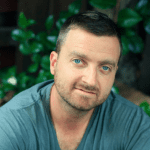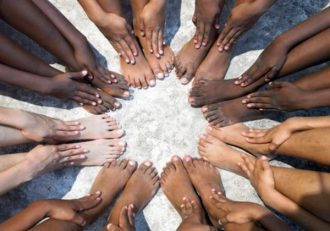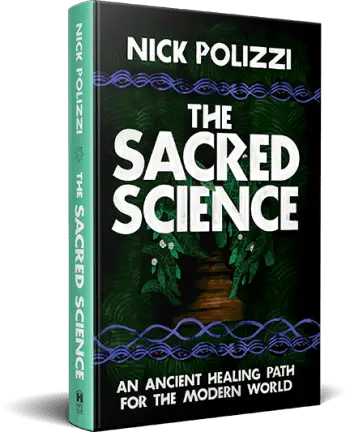By Nick Polizzi
Guest writer for Wake Up World
I was walking beneath a huge willka tree in the jungle a few months ago when a shiver of realization ran down my spine. This tree relies on all of its branches, leaves, and roots to interface with the outside environment in a harmonious way in order to survive and thrive. There is no one part that is more important than the other, there is no separation among its many constituents. Every inch of this willka has an important role to play, and the health of the surrounding jungle depends on each tree like this one living in full connection with its neighbors.
We’re not much different than trees in this respect. The system of life-flow that is so essential to a healthy forest also applies to the two-legged mammals that walk the trails carved into its soil, and can be summed up in one word. TRIBE.
To many, this word feels exotic or of a different cultural ilk, but I think it’s time we began to bring the true meaning of tribe back into our modern lives. In today’s world, our connection via the interwebs does loosely match tribe’s definition: a group of people linked by social, economic, religious, or blood ties. But for the traditional people of the world, tribe takes place in much closer proximity. It’s the extended family, the community that shares and cares for one another.
In tribal societies, everything is shared: successes, failures, responsibilities, leadership. No single life occurrence is too intense or overwhelming for an individual to handle, because they don’t need to shoulder the burden alone. For the Dagura tribe of Burkina Faso for example, when a death occurs, the entire village joins together in a complex and beautiful grief ritual that lasts for several days. Support for mourners continues long after the death, as grief is seen as a community event.
In tribal societies, success is also shared. No success is too large for one person to contain without their ego exploding, because accomplishments are the result of a group endeavor. For the Enawene Nawe tribe of Brazil, the Yãkwa ritual is a time for the tribe to spend several months fishing along the Amazon River by canoe, smoking the fish before returning to their villages with sustenance to last for months. Everyone wins, everyone celebrates, everyone is nourished.
Here in the U.S., our sense of tribe has largely vanished. Many ship their elders off to Florida or an isolated retirement home. We work our lives away so that we can afford our private houses, individual cars, and gizmos and gadgets that keep us disconnected from each other. Meanwhile, our children are growing up without the wisdom from their grandparents. Kids are left to their own “devices,” and these days, those devices have screens. Many young people have replaced the world with an electronic interface for personal connection.
In order for an organism to function, all of its parts must be intact. If we look at our society as an organism, with the nuclear family at its core, all signs point to an organism that is disjointed and blocked.
No one wants to feel like their lives lack meaning, like many of our retirees do. When tribal folks enter their later years, they make the natural transition from provider to wisdom-keeper. It is their time to emerge as teachers, caregivers for children, and a grounding force for young adults and parents. Their role shifts, but they are just as needed. And children of the tribe have two or three generations of role models, each with their own unique life perspective to bestow.
As a parent, I “see” how important my son River’s relationship with his grandparents is. They teach him a “way of being” that I simply don’t have access to yet. It’s magical and profoundly fulfilling to watch them interact.
This is just a glimpse of what is possible when we humans live in a fully interconnected way. So many of us feel alone and overwhelmed in our lives, even though we have loving friends and family. Could it be that we need to come closer into one another’s lives, and begin to share this human experience in a more meaningful way?
I believe that “tribe” is the prescription for many of the pitfalls in the modern world. But it comes with one price: we need to learn how to be intimately involved with one another again—with our families, with our neighbors, and spreading outward from there.
Over and over nowadays, I hear the same message being echoed: our needs and the needs of our loved ones are not being met. The irony is that our needs are all connected. The need of grandparents to have meaning can be quenched by bringing them closer to the family and their grandchildren. The need of parents to have support and some time for themselves can be accomplished by the same act. Our children’s need for human connection, attention, and mentorship can also be filled by bringing back the tribe.
There are so many inefficiencies in the way we’ve set ourselves up that just don’t make sense. If we are open to their wisdom, the indigenous tribes of the planet and the forest itself have a lot to teach us.
Stay curious,
Nick Polizzi
The Sacred Science: An Ancient Healing Path For The Modern World
The new book by Nick Polizzi.
In 2010, Nick Polizzi assembled a group of eight desperately ill patients from around the world and brought them into the heart of the Amazon rainforest to put the mysterious medicines of native shamans to the test. The healing journey that unfolded would change their lives — and his own — forever.
In his new book, ‘The Sacred Science’, Nick explores their primordial traditions further and reveals firsthand what it takes to truly heal ourselves of physical disease and emotional trauma. Part spiritual self-help book and part jungle adventure, ‘The Sacred Science’ is deeply personal and enlightening, and presents us with a bold new way of understanding the health of our mind, body and spirit, and the forgotten ways of a healthier, earth-connected ancestral past.
If you are trying to heal or bring balance to something inside yourself – physical or emotional – this revolutionary new book may be for you. It explains the core pillars of shamanic healing, and more importantly, how we can bring these ancient techniques into our life, right here – right now. You’ll learn practices and principles of native wisdom and gain a new understanding of what it means to heal — all told through a journey of exotic jungle medicines and harrowing rites of passage.
‘The Sacred Science: An Ancient Healing Path For The Modern World’ is available here in digital, paper and audio book formats.
PLUS, for a limited time, it also comes with a bunch of awesome bonuses, including workshops on shamanic dreaming and ancient herbal methods for awakening consciousness.
Recommended articles by Nick Polizzi:
- The Art of Smudging: A Shamanic Cleansing Ritual
- The Science of Ayahuasca
- Sacred Science: A Jungle Healing Technique You Can Use Anywhere
- Wired for Tribe
- 3 Wild Herbs for Lucid Dreaming
- Eye Gazing — An Exercise for Soul Vision
- A Native Smoke Ritual For Renewal and Clarity
- 3 Ancient Medicines That Already Live In Your Home
- A Breathing Exercise to Take You Higher
- The Art of Blessing Your Food
About the author:
 Nick Polizzi has spent his career directing and editing feature length documentaries about natural alternatives to conventional medicine. Nick’s current role as director of “The Sacred Science” documentary and author of “The Sacred Science: An Ancient Healing Path For The Modern World” stems from a calling to honor, preserve, and protect the ancient knowledge and rituals of the indigenous peoples of the world.
Nick Polizzi has spent his career directing and editing feature length documentaries about natural alternatives to conventional medicine. Nick’s current role as director of “The Sacred Science” documentary and author of “The Sacred Science: An Ancient Healing Path For The Modern World” stems from a calling to honor, preserve, and protect the ancient knowledge and rituals of the indigenous peoples of the world.
For more, visit www.thesacredscience.com.

If you've ever found value in our articles, we'd greatly appreciate your support by purchasing Mindful Meditation Techniques for Kids - A Practical Guide for Adults to Empower Kids with the Gift of Inner Peace and Resilience for Life.
In the spirit of mindfulness, we encourage you to choose the paperback version. Delve into its pages away from screen glare and notifications, allowing yourself to fully immerse in the transformative practices within. The physical book enriches the learning process and serves as a tangible commitment to mindfulness, easily shared among family and friends.
Over the past few years, Wake Up World has faced significant online censorship, impacting our financial ability to stay online. Instead of soliciting donations, we're exploring win-win solutions with our readers to remain financially viable. Moving into book publishing, we hope to secure ongoing funds to continue our mission. With over 8,500 articles published in the past 13 years, we are committed to keeping our content free and accessible to everyone, without resorting to a paywall.








